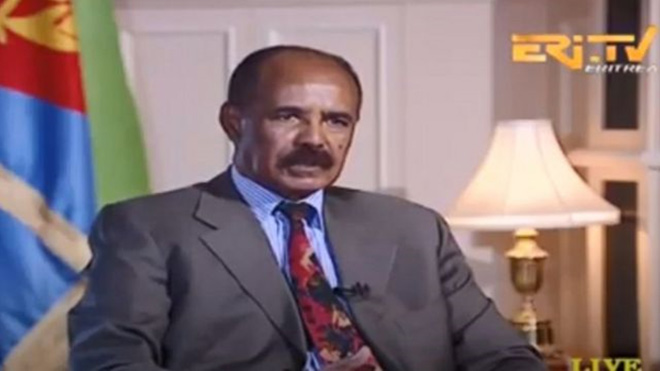President Isaias Afwerki: “It is our duty to provide help to Ethiopia”
For the first time the president has come out to admit that Eritrea is involved in the Tigray war in Ethiopia. The conflict in Tigray region started on 4 Nov, 2020.
Source: BBC Tigrinya

President Isaias Afwerki, in an interview with government media, said that “Eritrea is providing help to Ethiopia in accordance to its obligation.”
What are Eritrea’s obligations to Ethiopia?
For the first time the president has come out to admit that Eritrea is involved in the Tigray war in Ethiopia. The conflict in Tigray region started on 4 Nov, 2020.
Eritrea’s partaking in the conflict was kept a ‘secret’ to domestic audiences while the whole world was aware of what Eritrean soldiers were up to in the region. Both leaders, President Isaias Afwerki of Eritrea and PM Abiy Ahmed of Ethiopia denied repeatedly the presence of Eritrean troops in Tigray.
In the staged interview he said, “we Eritreans, more than others in the region, have experienced the problematic relationship for 80 years. Peace and stability in Ethiopia is of more concern to us than others”. The president did not elaborate on what sort of obligation he was referring to.
While explaining his admission to the role Eritrean is playing in Ethiopian domestic matters, he said “we are doing our best to contribute to the situation in Ethiopia.”
Again, he failed to specify what kind of contribution Eritrea is making. The world media has been talking about violence perpetrated by the Federal troops and Eritrean soldiers on the ground. Looting and destruction by Eritrean soldiers was witnessed and widely reported by many Tigrayans as well as the international media.
The president left out the presence of Eritrean troops in Tigray after the assault was declared over. On 28 November, the Ethiopian government announced that it had taken control of the city of Mekele, bringing "the last phase of its law enforcement operation" to an end.
It is to be remembered what the president had said in early 2020; “we will not fold our arms across our chest and sit still while matters of concern to us are developing in Ethiopia.”
The US and the EU have been calling for Eritrea to pull out its troops from Ethiopia. Some Ethiopian officials have also dared to reveal the presence of Eritrean troops in Tigray.
Ethiopian Human Rights Commission reported on the destruction of Eritrean refugee camps in Tigray region, namely Shimelba and Hetsats camps. The report included that the refugees inside the two camps have been dispersed.
Moreover, concerning the conflict that erupted in Tigray, the president argued that it was “utter madness” how the TPLF (Tigrayan forces) initiated it by invading the northern command.
There was friction concerning political and constitutional disputes between the Federal government and the region of Tigray for quite some time. According to PM Abiy Ahmed of Ethiopia, on the night of 3 November, Tigrayan security forces attacked the northern command that was based in Tigray escalating the tension to open hostility.
According to TPLF, the purpose behind the invasion of the northern command was to prevent the Federal forces from overpowering the region.
It is widely reported, due to the conflict two million people have been displaced inside the region and more than 60,000 people left Tigray for the Sudan.
UN reports that around 4.5 million people in the region require aid urgently.
More matters raised by the President
President Isaias Afwerki said that he had asked Dr Debrezion Gebremichael, the president of Tigray region, during the opening of the Omhajer checkpoint, why they were amassing unnecessary military power in the region.
However, Dr Debrezion said at the time that they were going to meet once again soon without disclosing what they talked about during their meeting.
President Isaias also accused the TPLF for obstructing the newly established Ethiopia/Eritrea relations and for being an impediment in demarcating the border. He did not give any details how the leaders of Tigray obstructed the peace accord and impeded border demarcation. On the contrary, Dr Debrezion said that he had a talk with President Isaias Afwerki regarding opening the whole Tigrai/Eritrea border.
On the other hand, the TPLF had been criticising the Jul 2018 peace accord for side-lining Tigray and for exclusively confining that talks between President Isaias and PM Abiy Ahmed.
The president has not clarified whether the contested Badme region is under the control of Eritrean forces now. And the interviewer, apparently, did not dare to ask.
He also said that the matter surrounding the Grand Ethiopian Renaissance Dam, matters that arose between Ethiopia, Sudan and Egypt, as well as the border friction between Ethiopia and Sudan should assume priority in resolving them. He mentioned that the friction is exacerbated due to interference of a foreign entity and is tied to some inner political interests. Again, he framed his criticism rather vaguely.
The interview has raised more questions than ever. The president made an admission to what people had known for a long time already – the role Eritrean troops played in the destruction of Tigray.
Eritreans want to know the moral justification for the war, the losses Eritrean troops sustained, and how the blood feud with the Tigrayans will ever be mended.


![[AIM] Asmarino Independent Media](/images/logo/ailogo.png)
